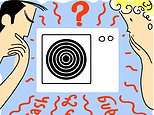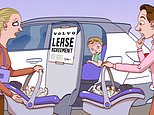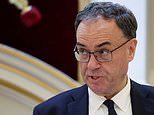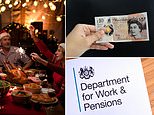I'm 41, if I died would my children now face inheritance tax on my pension?
My wife and I are both 41, with two young children, aged 6 and 4, and never considered inheritance tax an issue until the Budget raid on pensions.
Our house is worth about £1.2million with a £300,000 mortgage outstanding and between us we have about £100,000 in savings and investments.
My work defined contribution pension is currently worth about £300,000 and my wife has an old work pension worth about £10,000 and a Sipp worth about £40,000.
In our wills we leave everything to each other if one of us dies and in the terrible scenario where we both died, we would leave everything to the children.
As it stood before the Budget, they would have been able to have the house, our savings and pensions without losing any money to inheritance tax.
Would our children now lose 40 per cent of our pensions to inheritance tax?
My rough pension projection is that if I continue to have £1,000 per month go into my work pension and get a 6 per cent annual return, then in a decade the pot would be worth £710,000.
If something awful happened to me and my wife, would my children at age 16 and 14 now lose £284,000 of that to inheritance tax? How can this be fair?

Caught out: Those building up a pension pot for retirement who are unlucky and die early could now find their estate has an inheritance tax bill
Ian Dyall, of estate planning specialist at Evelyn Partners, replies: The Autumn 2024 Budget announced the government’s intention to charge inheritance tax on most pensions paid to beneficiaries on death.
Currently, if you die with unused funds in your defined contribution pension (as opposed to so-called final salary defined benefit schemes) it can be passed free of inheritance tax to a nominated beneficiary.
If you die before 75 then the beneficiaries can withdraw the money free of income tax as well, but if you die after 75 then they will pay tax at their normal income tax rate on any money they withdraw.
From April 2027 this will change. Any unused defined contribution pension funds and any death in service lump sums from defined benefit pensions will become subject to inheritance tax.
Again, as the beneficiary withdraws the funds there may be income tax to pay depending on whether you die before 75 or not.
Not all death in service payments are caught, it is only those linked to pensions, so people should check with their employer to see if their schemes are caught by the new legislation.

Ian Dyall: Pensions now fall in the IHT net
The method of paying the liability is currently convoluted but is subject to consultation.
The value of the unused pension or death in service lump sum will be added to the rest of your estate when calculating the inheritance tax liability.
However, that liability will be split proportionally, with the pension provider paying a share directly from the pension to HMRC and the remainder payable by the executers of the estate.
This will involve much greater communication between the pension provider and the personal representatives of the deceased’s estate and is likely to add to both the costs of administering the pension and lead to delays before the pension can be distributed.
Applying this to your circumstances, you are correct in thinking that, under current legislation, if you and your wife both died today you would have no inheritance tax liability.
You each have a nil rate band of £325,000 and an additional residence nil rate band of £175,000 that can be used to pass on your home to direct descendants, provided your total estate on death is worth less than £2million.
If you don’t use the allowances on first death, perhaps because you leave everything to your wife, then the allowances transfer to your wife so she could use both her allowances and your allowances on her death, totalling £1million (assuming she is not worth over £2million on her death).
It is worth pointing out that the allowances are now fixed until 2030, and even before the changes bring your pensions into account you are right on the limit of having an inheritance tax liability, with net assets worth £1million and total allowances worth £1million, so any growth on your non-pension assets is likely to lead to an inheritance tax liability.
If the new rules are introduced in their current form, then your pensions will become subject to inheritance tax at 40 per cent on your death assuming they exceed your nil rate band allowances when added to your other assets.
For some people things may be even worse. If their pensions push their total wealth above £2million, then the pension funds may also cause their residence nil rate bands to taper away as well. This is not fully clear from the budget briefing documents, but that appears to be the case.
Whether the proposed changes are fair or not is open to debate, but it is worth pointing out that being able to pass your pensions on without tax is a relatively new phenomenon introduced at the same time as the pension freedoms in April 2015.
Prior to that, if you died over age 75, there was a 55 per cent tax on any unused pension funds if they were left to a non-dependent beneficiary. This was a tax on all unused pension funds irrespective of the pension holder’s other wealth.
Currently only around 6 per cent of people are liable to inheritance tax. By taxing unused pension funds through inheritance tax many people will not need to pay a tax charge on their pensions on death, although potentially it will still add complexity to the administration of their estate.
What can people do about this?
Firstly, if their pension is through their company then they should ask the company to clarify which parts of any death benefits will be potentially liable to inheritance tax under the new rules. This may prompt the company to structure their death is service in a different way.
Whilst you are building your pension, the potential liability to inheritance tax should be considered when looking at the rest of your planning.
Pensions are still highly tax efficient vehicles for income tax and capital gains, so the new legislation should not put people off contributing to pensions.
Once your pensions are in payment then you should consider whether you need all of the pension fund you have and whether you are likely to have surplus funds on death.
There are a number of options to consider if you don’t need all the funds you have accumulated.
Options could include taking your tax-free cash and gifting it. Provided you live for seven years then the money will be outside your estate for inheritance tax.
You could take more income than you need from the pension and either give it away or use it to fund a whole of life assurance policy held in trust.
The extra money you take is likely to be covered by the ‘normal expenditure from income’ exemption and therefore immediately exempt from inheritance tax.
There are other options and taking advice at times of change such as this is worthwhile if you think you are likely to have a liability.
Of course, the simplest option is simply to spend your pension. What would you spend your money on if everything was on a 40 per cent off sale?





















































